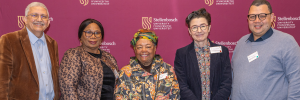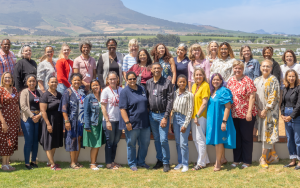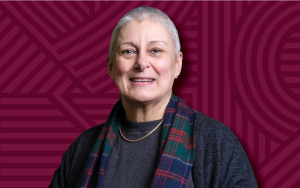
Prof Nico Koopman, Dr Zethu Mkhize, poet Diana Ferrus, Prof Christi van der Westhuizen and Dr Leslie van Rooi at the recent Transformation Indaba.
Transformation Indaba confronts the past, reimagines the future
- The two-day Transformation Indaba at SU was characterised by unflinching reflections on the complexities of institutional change.
- Speakers urged the University to move beyond policy to authentic transformation rooted in empathy, equity and shared responsibility.
- The event reaffirmed SU’s commitment to building a university where every person can truly belong.
Stellenbosch University’s (SU) annual Transformation Indaba opened with a call for deep reflection, honesty and collective responsibility as academics, students and staff gathered at the Devonvale Golf and Wine Estate to examine the institution’s progress with transformation. The theme this year was Embarking on the next phase of holistic transformation.
In his welcoming remarks, Prof Nico Koopman, Deputy Vice-Chancellor: Social Impact, Transformation and Personnel, reminded colleagues that transformation is “not a destination but a way of life”. He urged the University community to continue their journey toward “dignity, healing, justice, freedom and equality” through shared ownership and moral courage.
The keynote address by Prof Christi van der Westhuizen of the University of the Western Cape challenged universities to confront the deeper cultural logics that continue to reproduce inequality. She warned that transformation cannot be achieved through surface-level reform alone, calling instead for “epistemic decolonisation” — the embracing of knowledge systems and lived experiences beyond Euro-American traditions.
Responding to questions from the audience, Van der Westhuizen had strong words for people emboldened by the American alt-right who conflated transformation with “wokeness” or identity politics. “I don’t regard our long and proud history of activism for justice a so-called wokeism,” she stated. “That’s ridiculous, and it’s an insult to every person who’s ever battled against racial, gender and other injustices in South Africa.”
She commended Dr Zethu Mkhize, Director of Transformation at the Centre for the Advancement of Social Impact and Transformation (CASIT) and programme director of the first day of the Indaba, for inviting scholarly engagements around the topic of institutional change. Her address set the tone for an event that was both intellectually demanding and emotionally charged.
Acclaimed poet Diana Ferrus, who holds an honorary doctorate from SU, closed the first session with a reading of her poem “It is a long walk to freedom”, reminding participants that transformation remains a collective, ongoing struggle for dignity and belonging.
Tackling exclusion, reimagining access
Subsequent sessions turned an unflinching gaze on the lived experiences within academia – from academic xenophobia and neurodiversity to questions of universal access and economic empowerment.
Dr Precious Simba, lecturer in education policy studies, exposed the subtleties of “academic xenophobia”, describing how foreign African academics often face professional isolation and stalled progression despite their contributions. “Xenophobia in academia wears a suit,” she remarked. “It chairs a committee, it drafts policy, it is polite, it is procedural. And yet it is equally devastating, because it is about how it frames people from certain countries.”
Futurist Dr Doris Viljoen of the Institute for Futures Research outlined multiple scenarios for the higher education sector, cautioning that universities must adapt swiftly to technological and social change. “The world is not waiting for us,” she warned, urging universities to embrace innovation while retaining their public mission.
The day’s final plenary session on equity and inclusion brought these ideas home to SU’s own context. Joanne Williams and Elsa Frylinck reframed broad-based black economic empowerment (B-BBEE) as a strategic driver of change rather than a compliance exercise. Dr Olebogeng Mokgantshang emphasised that curriculum transformation requires a “shift from tick-box exercises to substantive engagement with knowledge”.
Perhaps the most moving voice of the day was that of Dr Ethel Phiri, who shared her experience as a neurodivergent academic navigating an institution still learning to accommodate difference. “Inclusion makes us better teachers, better researchers and better colleagues,” she reflected.
The session ended with a powerful reminder by Dr Marcia Lyner-Cleophas that “universal access benefits us all, not just those with disabilities”.
Truth-telling, accountability and hope
If the first day of the Transformation Indaba invited reflection, the second demanded honesty. Lovelyn Nwadeyi, a former student leader and founder of LN Advisors, delivered a keynote that many described as the most impactful moment of the event. Speaking with disarming candour, she revisited her time at SU during the #FeesMustFall movement, when she chose to discontinue her studies because of the “toxic environment” she experienced.
Using the Igbo word “ma” – meaning both “beauty” and “knife” – Nwadeyi captured the paradox of a town whose picturesque charm coexists with painful histories. “The beauty of Stellenbosch so perfectly masks the pain that this place has caused and is still causing today,” she said. She cautioned that as long as transformation is understood as a slow, technical process, rather than a dismantling of deep-seated power structures, “we will keep discussing the same things, year in and year out, making minimal progress”.
Her words resonated with students and staff who later participated in a panel discussion on the meaning of transformation today. Student leaders Senzakahle Mazibuko, Simamkele Tozela, Hakeemah Matinka, Sanet Viljoen and Sam Morrick reflected on issues of diversity, accessibility, mental health and belonging.
The Indaba concluded with a spirited feedback session from group discussions led by Dr Jean Farmer and others, weaving together themes from across the two days – from economic empowerment and curriculum transformation to the ethics of inclusion.
Koopman, in his closing remarks, urged participants to embrace discomfort as integral to progress. “There is no transformation without discomfort,” he said. “Make progress more visible. Go faster, go deeper. Build a university that is a home for all.”
The message of the 2025 Transformation Indaba was clear: Transformation is a collective journey, one that demands empathy, courage and an unrelenting commitment to justice and belonging.



